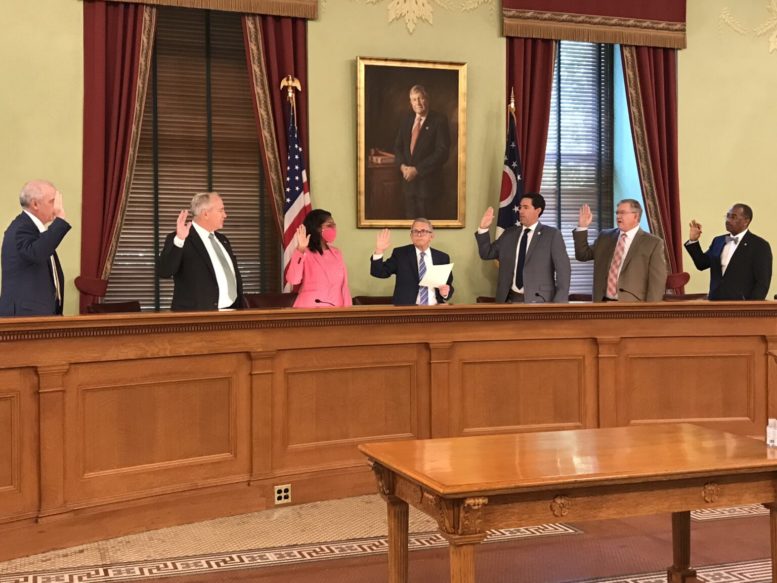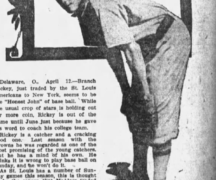BY SUSAN TEBBEN
The ACLU has filed an expected lawsuit disputing the partisan legislative redistricting maps passed earlier this month by the Ohio Redistricting Commission.
The Ohio and national chapters of the American Civil Liberties Union, along with law firm Covington & Burling, LLP, announced the lawsuit Thursday afternoon, accusing the Republican majority of “disrespecting the letter and spirit of the constitutional reforms passed overwhelmingly by Ohio voters in 2015.”
The ACLU and Covington & Burling are presenting the lawsuit on behalf of the Ohio Chapter of the A. Philip Randolph Institute, unnamed individual plaintiffs and the League of Women Voters of Ohio.
The parties in the court challenge contend that the maps violate the constitution by not accounting for the “partisan balance of House and Senate districts correspond closely to the statewide preferences of the voters of Ohio.”
“This is an illegal map, plain and simple,” said Robert Fram, of Covington & Burling, in a statement.
The lawsuit accuses the commission of a “brazen manipulation of district lines for extreme partisan advantage” that “doubly dishonors the honors of this state.”
“After decades of working to end partisan gerrymandering in the Buckeye State, the League of Women Voters of Ohio asks the Ohio Supreme Court to defend the rights of everyday Ohioans to have legislative districts that serve and represent them rather (than) be rigged to favor the short-sighted and selfish interests of political parties and candidates,” said Jen Miller, president of the League of Women Voters said in a statement.
A spokesperson for Senate President Matt Huffman, who presented the maps that were eventually approved by the redistricting commission on Sept. 16, said Senate Republicans “are confident the maps approved by the Redistricting Commission are constitutional and compliant.”
Redistricting Commission co-chair state Sen. Vernon Sykes, one of the two Democrats to vote against the map said he, too, believes the maps are not constitutional.
“Unfortunately, the maps adopted last week by the Republican members of the Redistricting Commission do not comply with those requirements,” he said in a statement. “They favor one political party and do not meet the litmus test of fairness and proportionality described by the Constitution.”
A spokesperson for fellow co-chair and House Speaker Bob Cupp also defended the maps.
“Lawsuits happen every time there is a new map,” said Aaron Mulvey deputy press secretary for the House GOP. “We knew this was coming, and the state will defend the constitutional maps approved by the Redistricting Commission.”
If the Ohio Supreme Court finds the maps to be unconstitutional, they would return to the commission for a second time.
The lawsuit comes as congressional redistricting is set to begin this month. If the state legislature can’t come to an agreement by Sept. 30, those maps will also go to the commission for consideration.
***
Also from Ohio Capital Journal:
Ohio House Speaker leans into ‘medical freedom’; ‘We’re just responding to the Ohioans we hear speaking to us.’
The Republican Speaker of the Ohio House, under mounting pressure from the nascent anti-vaccination movement within the GOP, said his caucus is soon to unveil consensus legislation to ban vaccine mandates.
Speaker Bob Cupp, R-Lima, said to reporters Wednesday that House leadership is in the “final stages” of putting together a bill to erect legal protections for Ohioans who refuse vaccination.
“There is a lot of strong interest from people all across Ohio to develop a path that protects individuals’ medical freedom but also protects the safety of Ohio,” he said.
People who are vaccinated against COVID-19 are five times less likely to become infected and 10 times less likely to die or require hospitalization due to the disease, according to CDC data released last week. State hospitals are filled with the most COVID-19 patients, who are overwhelmingly unvaccinated, since January. Some hospitals in southern and southeastern Ohio are approaching COVID-19 patient levels not seen since their peaks in December, when vaccines weren’t available.
Ohio has the 10th lowest rate of vaccination by state, with only 65% of adults having received their first dose. READ MORE
Race education bills get big turnout in legislature, most urging opposition; Amendment to bill targets K-12 education
Both bills that would change the way racial issues are taught in schools appeared in an Ohio House committee this week, and the overwhelming majority of citizen speakers wanted to see the proposed legislation go away.
House bills 322 and 327 were up for committee consideration on Wednesday, and Republicans amended HB 322 to specifically target K-12 education in banning “divisive concepts” that they say pit one race against another or explain history in a way that “blames” any race for the oppression of another.
The two amendments with “clarifying language,” according to state Rep. Shane Wilkin, R-Hillsboro, specified the Ohio State Board of Education and the state Department of Education as the state agencies overseeing provisions in the bill, which leaves out the Ohio Department of Higher Education, thus exempting colleges and universities from the regulations.
Another amendment considered during the House State & Local Government Committee meeting broadened the types of classes where the provisions of HB 322 would apply, making the “divisive subjects” prohibitions apply to all instruction, instead of just subjects like social studies or U.S. government. READ MORE





